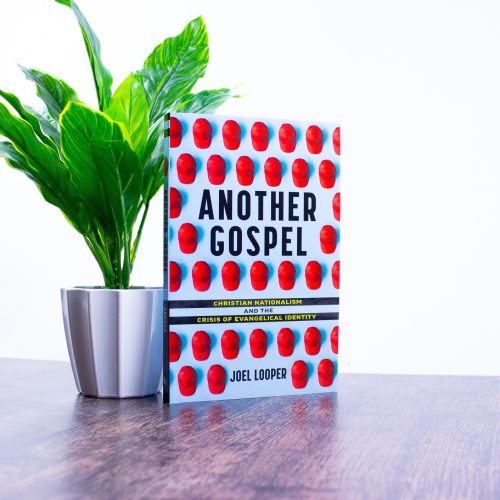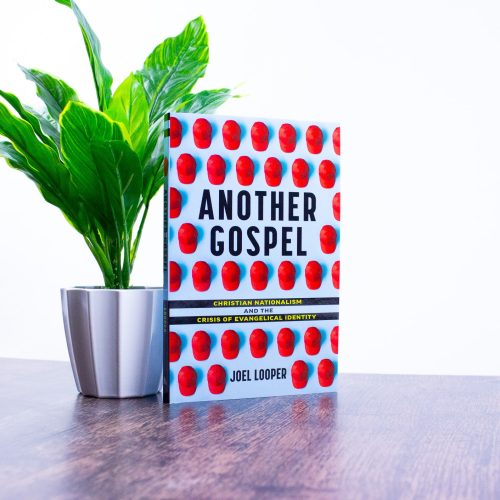
ANOTHER GOSPEL: Christian Nationalism and the Crisis of Evangelical Identity. By Joel Looper. Grand Rapids, MI: Wm. B. Eerdmans Publishing Co., 2024. Ix +150 pages.
The nature of the church-state relationship in the United States has an interesting history. Officially the government is neutral in matters of religion. It neither establishes nor disallows religious expressions to exist. Nevertheless, forms of civil religion have existed since the nation was founded. In the 1950s Congress made the phrase “In God We Trust” the nation’s motto, pushing aside the unofficial motto of E Pluribus Unum. Politicians regularly ask God to bless the nation, and invocations are given at civic events. For the most part, America’s civil religion is vaguely Christian but only because Christianity is the majority religion in the nation. That said, no denomination dominates, though certain denominations have an influential presence in certain states. Consider the role the Church of Jesus Christ of Latter Day Saints plays in Utah, though the Mormon influence isn’t as great today as it once was. The United States is, at least compared to other Western nations, both highly religious and religiously diverse.

Robert D. Cornwall
In recent years we’ve seen a growing concern about the presence of forms of Christian Nationalism in the United States. It is especially present among white evangelicals, which has largely aligned itself with a Donald Trump led Republican Party. Numerous books have emerged in recent years addressing this growing phenomenon in the United States and elsewhere. Each author and book offers its own take and vantage point. Among the many books available to us is Joel Looper’s Another Gospel. In this book, Looper, an evangelical who teaches at Baylor University and serves as the coordinator of Shalom Mission Communities, addresses, as the book’s subtitle reveals, Christian Nationalism and the Crisis of Evangelical Identity.
As a reader/reviewer who is post-evangelical and a retired Mainline Protestant (Disciples of Christ) pastor, I recognize that this book is not directed at me (though perhaps it does speak to the me of forty-five years ago). Looper writes as an evangelical to evangelicals calling on them to abandon Christian Nationalism, which he believes leads to the deformation of the church and return to what he calls the “politics of the church.” He’s not the first person to speak of this understanding of the church, which I struggle to fully understand. That said, I appreciate the reminder that the church can easily get coopted by the culture, including the political culture.
I found Looper’s presentation to be challenging and at times disconcerting. I found myself at times fully on board and at others in a very different place. Regarding the latter, I came to the book as a Mainline Protestant pastor who is politically liberal, open and affirming when it comes to LGBTQ rights and concerns, and lean pro-choice, though I’ve never been comfortable with that wording. He believes that same-sex relationships are sinful and that gays should remain celibate. He also believes that abortion is sinful. What distinguishes him from Christian Nationalists and culture war evangelicals is that he doesn’t believe it is the church’s role to push for laws that abolish abortion or limit the rights of LGBTQ persons.
In arguing his point, he describes the church as being a Gospel people who are defined by Jesus, not American culture. The current politicized gospel that has merged with Trumpism is another gospel. Therefore, this form of the church is a deformed version of Christianity. While he might be theologically and even politically conservative, he strongly rejects the impact of Trump on evangelicalism. The result will be, given time, “most of us in the evangelical movement — or, at any rate, our children — will just be traditionalist, individualist, conservative, and passionately patriotic Americans. But not Christians” (p. 20).
If Chapter 1 asks whether today’s version of white evangelicalism can be defined as a gospel people, Chapter 2 speaks of “Baptizing the National Body.” Here he takes us on a bit of a historical tour from the New Testament to the present. In doing this he reveals the ways church and state have merged together, and the implications of that merger for the church. While the United States has never been a Christian nation, a form of civil religion took root within the churches. That has made it susceptible to cultural changes that run counter to the Gospel. That conversation leads to Chapter 3, which is titled “The Scandal of the Evangelical Heart.” In this chapter Looper begins exploring the impact of Trump on the evangelical church and its embrace of Christian Nationalism such that churches are defining themselves by political realities and not Jesus. He concludes that “We Americans live and breathe the gospel of America. It’s so familiar, many of us fail to recognize it unless someone points it out” (p. 68).
Perhaps the best way to view the current situation in the United States is to look to another expression of Christian Nationalism. The form that Looper chooses is that of “Putin’s Christian Nationalism” (Chapter 4). In my estimation, this may be the most important chapter of the book. What Looper does here is point out the parallels between Putin’s Christian Nationalism and what is taking form in the United States. While I was surprised that Looper didn’t discuss Victor Orban’s version of Christian Nationalism, in many ways Orban is an acolyte of Putin. The Russian president, who once was a KGB agent, has embraced the Russian Orthodox Church, making the church essentially an expression of the state. While most Russians don’t attend church or even believe in God, Russian Orthodoxy has become an expression of what it means to be Russian. With that in mind, Putin uses religion to create a foundation for his war on Ukraine. He justifies his war as being necessary to protect the motherland of Russian Orthodoxy, which includes the Crimea. Crimea is important to this version of Christian Nationalism because this is where Vladimir the Great, the Grand Prince of Kyiv was baptized, effectively making the Kyivan Rus Christian. What makes Putin so important is that many American evangelicals look to him as a model protector of Christian supremacy. Putin is no fool. He’s a former KGB agent who knows how to manipulate people, including religious people to sustain his power. There are warnings here that need to be attended to.
Looper titles Chapter 5 “Gospel Politics.” It is in this chapter that Looper offers his vision for the politics of the church. In this chapter he defines the kind of church that steers clear of becoming subservient to the state or the culture. This discussion of a gospel politics that is not connected with the state, but one that follows Jesus in loving the neighbor, going the second mile, feeding the hungry, and more, but most importantly preaching the gospel of Jesus and not a political system.
That leads us to the final chapter “Trump and the Gospel of America.” Here, Looper writes as an evangelical to evangelicals telling them that voting for Donald Trump is not appropriate. Why, essentially, he suggests that by doing so Christians embrace this Gospel of America that replaces Jesus as Messiah with Donald Trump. He shows how Trump presents himself in messianic terms, offering himself as the only one who can save America. Not only that, but he portrays himself as being on trial as a substitute for his followers. In other words, he has embraced penal substitutionary atonement and made himself the one who atones for his followers. Interestingly, Looper shows us that many who consider themselves evangelicals as they follow Trump no longer feel the need for the church. They may continue believing traditional Christian ideas, including that the Bible is the Word of God and even that it is inerrant, but it has become nothing more than a totem to place on the coffee table. Looper suggests that his point in writing the book is not to show that evangelicals have been treated fine even as they have been pushed to the periphery of American culture, rather, “It’s that we never should have made it our business to fight for a seat at the nation’s table” (p. 121). He sees only two paths out of this situation—repentance or judgment.
As I noted at the top, this is a book that speaks to a different audience from the one I inhabit. He makes it clear he has little interest in liberal Mainline Protestantism. He believes that we also have lost our way, but he doesn’t feel it is his place to correct us. While I may disagree with his assessment of Mainline Protestantism, as well as not sharing his views on LGBTQ matters and abortion, he speaks important words to his own community. As for members of the Mainline community, we too can learn something from what he shares here about the dangers to the church and its witness of connecting our witness to the politics of the day. Fortunately, Mainliners do have a text that speaks to us — Baptizing America: How Mainline Protestants Helped Build Christian Nationalism by Brian Kaylor and Beau Underwood (Chalice Press). Their book speaks directly to Mainline Protestants, who they suggest set the wheels in motion for the current version of Christian Nationalism. But we have something we can learn from Looper as well.
The message that Another Gospel and other books on Christian Nationalism present concerns the impact of nationalism on both the nation and the church. When we connect church and state in nationalistic terms, this damages the church and its witness. The issue isn’t patriotism. We can love the land where we live, but it’s also important to remember that God and the Christian community transcend the nation.
This review originally appeared on BobCornwall.com.
Robert D. Cornwall is an ordained minister in the Christian Church (Disciples of Christ). Now retired from his ministry at Central Woodward Christian Church (Disciples of Christ) of Troy, Michigan, he serves as Minister-at-Large in Troy. He holds a Ph.D. in Historical Theology from Fuller Theological Seminary and is the author of numerous books including his latest “Second Thoughts about the Second Coming: Understanding the End Times, Our Future, and Christian Hope” coauthored with Ronald J. Allen. His blog Ponderings on a Faith Journey can be found at www.bobcornwall.com.

